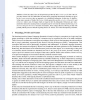21 search results - page 2 / 5 » Game interpretation of Kolmogorov complexity |
89
Voted
CSL
2008
Springer
15 years 2 months ago
2008
Springer
We present a game-based semantic framework in which the time complexity of any IMELL proof can be read out of its interpretation. This gives a compositional view of the geometry of...
111
Voted
ESANN
2007
15 years 2 months ago
2007
Any order parameter quantifying the degree of organisation in a physical system can be studied in connection to source extraction algorithms. Independent component analysis (ICA) b...
107
Voted
JANCL
2007
15 years 15 days ago
2007
Qualitative coalitional games (QCGs) were introduced as abstract formal models of goal-oriented cooperative systems. A QCG is a game in which each agent is assumed to have some goa...
103
Voted
WOLLIC
2009
Springer
15 years 7 months ago
2009
Springer
Abstract. Proofs in Ludics, have an interpretation provided by their counter-proofs, that is the objects they interact with. We shall follow the same idea by proposing that sentenc...
116
Voted
SIGECOM
2005
ACM
15 years 6 months ago
2005
ACM
We present a new approach to representing coalitional games based on rules that describe the marginal contributions of the agents. This representation scheme captures characterist...

